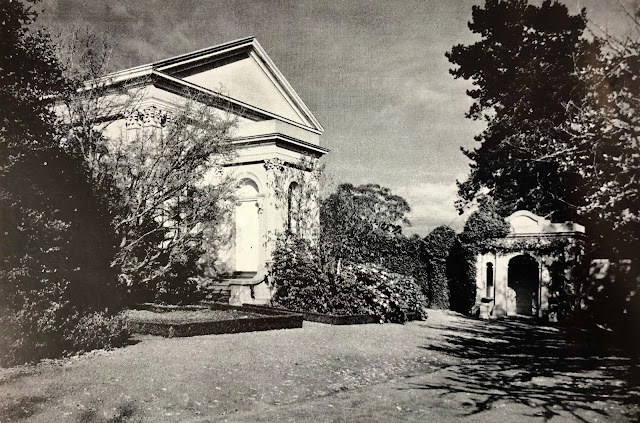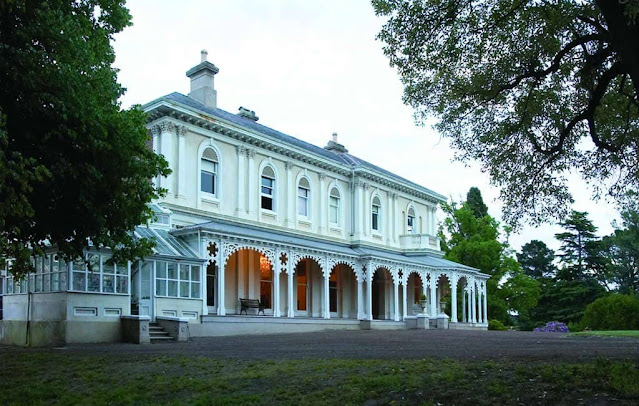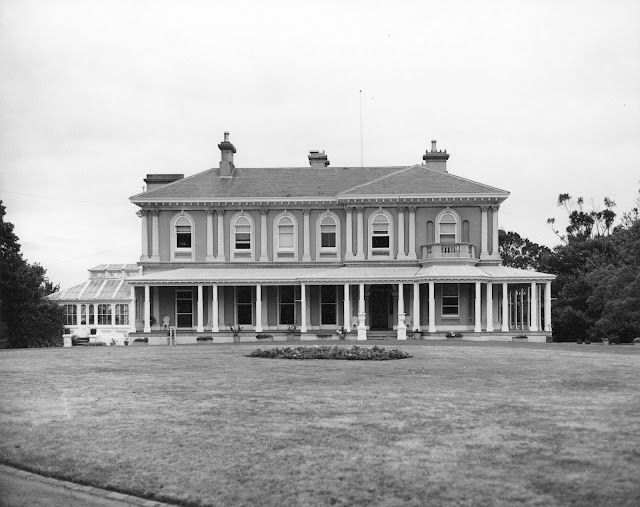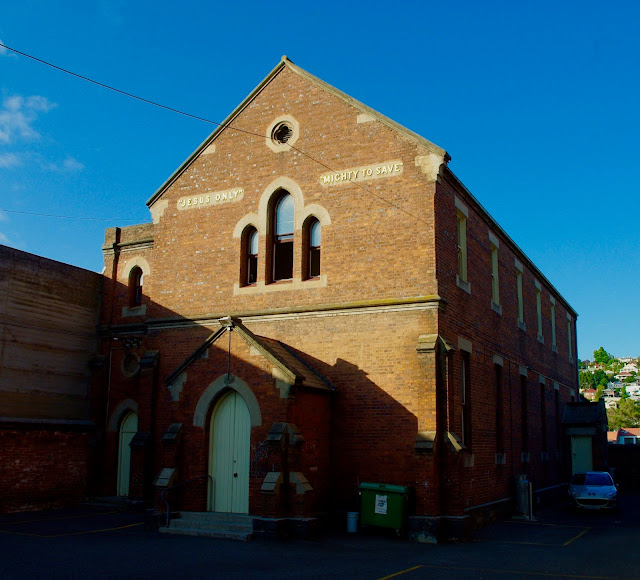No. 1242 - Launceston - Mount Pleasant - Henry Reed's Chapel - "The Big Room"
Mount Pleasant is an Italianate-Victorian mansion on a hill above South Launceston. It is perhaps one of the finest colonial houses in northern Tasmania. It was built in 1865 by John Crookes (1805-1870), a prominent merchant, churchman and politician. The property was acquired by Henry Reed when he returned to Tasmania in 1873.
Henry Reed was a wealthy businessmen and an ardent evangelist who made a significant contribution to the Christian cause in Australia and in Britain. Reed was born in Doncaster, England in 1806. At the age of 20 he sailed for Hobart arriving in April 1827. From Hobart he walked to Launceston, a distance of 120 miles. Reed had a deep religious experience in the early 1830s when a small boat he was rowing overturned on the Tamar River and he almost drowned. Once ashore, he knelt down to give thanks for his deliverance. This incident had an enormous influence on his religious life.
As a businessman Reed made his initial fortune through the acquisition of land and by using convict labour to develop his properties. In 1828 Lieutenant-Governor Arthur granted Reed 640 acres along the Nile River. He soon acquired other properties near Launceston and established businesses in shipping, whaling, sealing and general trading out of Launceston to Hobart, Sydney, New Zealand and London. In 1831 Reed sailed for England where he married his cousin Maria Susanna Grubb.
Reed's enterprises helped the establishment of the new settlement at Melbourne with his loan of £3000 to John Batman. As a Wesleyan and a fervent evangelist Reed claimed to have preached the first sermon at Melbourne, his congregation being Henry and John Batman, William Buckley and three Sydney aborigines.
In 1847 Reed returned to England where he remained for the next twenty six years. He undertook many preaching engagements throughout the north of England and was deeply affected by the widespread poverty he encountered there. Reed's wife died in 1860 and three years later he married Margaret Frith, an ardent church worker. After this marriage his philanthropic interest increased. He became closely associated with General William Booth and helped him financially and with advice in the formative years of the Salvation Army. Soon after Reed returned to Tasmania he purchased Parr's Hotel in Wellington Street as the site for his new Mission Church. The Mission opened for worship in July 1876.
After purchasing Mount Pleasant, Reed set about creating a place for private worship, as was the practice at his properties at Wesley Dale, Mountain Villa and Dunorlan. Hudson Fysh, Henry Reed’s grandson, recalled that “at Mount Pleasant, …one of the first things Reed did was to build a large hall for the holding of religious services”. Religious services were initially held in Mount Pleasant’s large dining room but this was found to be not big enough.
In ‘A Far Microcosm’, Eric Ratcliff describes the new hall:
“It stands in the garden at some distance from the house, and is a building of temple form with porch, round-headed windows and Corinthian pilasters”.
The new hall was used for family gatherings and religious observances and was known as “the big room”. After Reed’s death in 1880, the hall ceased being used as a place of worship.
Mount Pleasant and its hall has changed little since Henry Reed’s era. The property remains privately owned.
Cornwall Chronicle, Saturday 18 February 1865, page 2
Henry Reed was a wealthy businessmen and an ardent evangelist who made a significant contribution to the Christian cause in Australia and in Britain. Reed was born in Doncaster, England in 1806. At the age of 20 he sailed for Hobart arriving in April 1827. From Hobart he walked to Launceston, a distance of 120 miles. Reed had a deep religious experience in the early 1830s when a small boat he was rowing overturned on the Tamar River and he almost drowned. Once ashore, he knelt down to give thanks for his deliverance. This incident had an enormous influence on his religious life.
As a businessman Reed made his initial fortune through the acquisition of land and by using convict labour to develop his properties. In 1828 Lieutenant-Governor Arthur granted Reed 640 acres along the Nile River. He soon acquired other properties near Launceston and established businesses in shipping, whaling, sealing and general trading out of Launceston to Hobart, Sydney, New Zealand and London. In 1831 Reed sailed for England where he married his cousin Maria Susanna Grubb.
Reed's enterprises helped the establishment of the new settlement at Melbourne with his loan of £3000 to John Batman. As a Wesleyan and a fervent evangelist Reed claimed to have preached the first sermon at Melbourne, his congregation being Henry and John Batman, William Buckley and three Sydney aborigines.
In 1847 Reed returned to England where he remained for the next twenty six years. He undertook many preaching engagements throughout the north of England and was deeply affected by the widespread poverty he encountered there. Reed's wife died in 1860 and three years later he married Margaret Frith, an ardent church worker. After this marriage his philanthropic interest increased. He became closely associated with General William Booth and helped him financially and with advice in the formative years of the Salvation Army. Soon after Reed returned to Tasmania he purchased Parr's Hotel in Wellington Street as the site for his new Mission Church. The Mission opened for worship in July 1876.
After purchasing Mount Pleasant, Reed set about creating a place for private worship, as was the practice at his properties at Wesley Dale, Mountain Villa and Dunorlan. Hudson Fysh, Henry Reed’s grandson, recalled that “at Mount Pleasant, …one of the first things Reed did was to build a large hall for the holding of religious services”. Religious services were initially held in Mount Pleasant’s large dining room but this was found to be not big enough.
In ‘A Far Microcosm’, Eric Ratcliff describes the new hall:
“It stands in the garden at some distance from the house, and is a building of temple form with porch, round-headed windows and Corinthian pilasters”.
The new hall was used for family gatherings and religious observances and was known as “the big room”. After Reed’s death in 1880, the hall ceased being used as a place of worship.
Mount Pleasant and its hall has changed little since Henry Reed’s era. The property remains privately owned.
 |
| Mount Pleasant Chapel - Early Houses of Northern Tasmania, |
 |
| Mount Pleasant in 2019 - Tasmanian Times.com |
 |
| Mount Pleasant at Launceston (1966) Photographs of Tasmanian Buildings and Individuals Taken by Sir Ralph Whishaw - Libraries Tasmania (NS165) |
 |
| Henry Reed's Mission Church - Wellington Street, Launceston |
 |
| Henry Reed's store, Cameron Street,(Macquarie House) - Libraries Tasmania -https://stors.tas.gov.au/LPIC1-7-255 |
 |
| Photographic portrait of Henry Reed of Launceston - Libraries Tasmania [PH30-1-9909] |
Sources:
Cornwall Chronicle, Saturday 18 February 1865, page 2
http://adb.anu.edu.au/biography/reed-henry-2582
Fysh, Hudson. Henry Reed : Van Diemen's Land pioneer / by his grandson Hudson Fysh Cat & Fiddle Press Hobart 1973
Ratcliff, E. V. R. and Fullers Bookshop with Foot and Playsted, issuing body. A far microcosm : building and architecture in Van Diemen's Land and Tasmania 1803-1914 / (Volume 4) Eric Ratcliff Fullers Bookshop with Foot and Playsted Launceston, Tasmania 2015
Robertson, E. Graeme; Craig, Edith N.; Early houses of Northern Tasmania, an historical and architectural survey, vol. I, Melbourne : Georgian House, 1964.
Fysh, Hudson. Henry Reed : Van Diemen's Land pioneer / by his grandson Hudson Fysh Cat & Fiddle Press Hobart 1973
Ratcliff, E. V. R. and Fullers Bookshop with Foot and Playsted, issuing body. A far microcosm : building and architecture in Van Diemen's Land and Tasmania 1803-1914 / (Volume 4) Eric Ratcliff Fullers Bookshop with Foot and Playsted Launceston, Tasmania 2015
Robertson, E. Graeme; Craig, Edith N.; Early houses of Northern Tasmania, an historical and architectural survey, vol. I, Melbourne : Georgian House, 1964.


Can I please have the address of Mt Pleasant as I'm Iin Launceston today with one of Henry Reeds descendants and she's desperate to see it
ReplyDeleteThe address given on the Heritage Register is: 9 Luxmore Place, Prospect. The property is not visible from the road but this is the point of entry. Luxmore Place is accessed off Westbury Road via Caroline Street. I hope this helps.
ReplyDeleteIt might also be accessible from the Kings Meadows side via a laneway close to 86 Gibson Street.
ReplyDelete